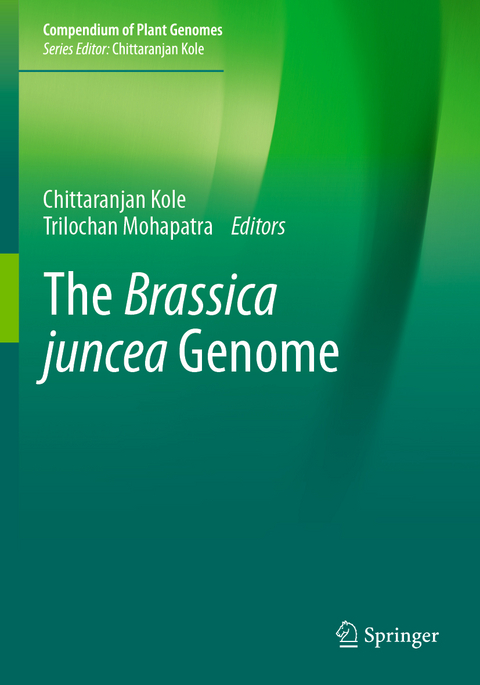
The Brassica juncea Genome
Springer International Publishing (Verlag)
978-3-030-91509-4 (ISBN)
This book is the first comprehensive compilation of deliberations on elucidation and augmentation of the genome of Brassica juncea, one of the leading oilseed crops of the world, popularly called as brown mustard, Indian mustard, Chinese mustard, or Oriental mustard. It includes discussions on genepools; genetic diversity and its characterization; classical genetic and traditional breeding; basics and application of heteroploidy; techniques and applications of introgressive hybridization; in vitro culture for micro-propagation, somatic mutation, somatic embryogenesis, and somatic hybridization; genetic engineering including genetic transformation and gene silencing; and molecular genetic mapping and mapping of genes and comprehensive delineations on genome sequencing and comparative genomics; resequencing for elucidation of origin and diversity; large-scale genome analysis; plastid genome sequence; transcriptomics; metabolomics; proteomics; evolutionary genomics; role of regulatory genes in development and adaptation and their utilization in trait improvement; precise breeding for yield, quality, and resistance to biotic and abiotic stresses; and prospects of genome editing.
lt;p>Prof. Chittaranjan Kole is an internationally reputed scientist with an illustrious professional career spanning over thirty-seven years and original contributions in the fields of plant genomics and biotechnology leading to the publication of more than 150 research articles in globally leading journals. He has edited over 150 books for the leading publishers of the world including Springer Nature, Wiley-Blackwell and Taylor & Francis Group. His works and editing acumen have been appreciated by seven Nobel Laureates including Profs. Norman Borlaug, Arthur Kornberg, Werner Arber, Phillip Sharp, Günter Blobel, Lee Hartwell and Roger Kornberg. Previously he was a Visiting Professor in The Pennsylvania State University and Clemson University. He also served as the Vice-Chancellor of the BC Agricultural University in India. He is also the President and Founding Principal Coordinator of the International Climate-Resilient Crop Genomics Consortium (ICRCGC) and International Phytomedomics and Nutriomics Consortium (IPNC).
Dr. Trilochan Mohapatra, Secretary, Department of Agricultural Research and Education, Government of India, and Director General, Indian Council of Agricultural Research, is an internationally renowned scientist and science administrator. His is widely recognized for his pioneering contributions in the fields of Agricultural Genomics and Molecular Breeding. He has experience of guiding agricultural research and education as the Director and Vice-chancellor of the Indian Agricultural Research Institute, New Delhi (Deemed University); and as Director, ICAR-National Rice Research Institute, Cuttack, Odisha. Presently, he has been providing leadership to Agricultural Research and Education System in India, which is responsible for policy formulation and implementation, knowledge management and human resource development. He has also shared the vision to gear up sustainable agricultural production in SAARC countries and transforming livelihoods in South Asia. He has published over 230 research papers in national and international journals, several book chapters and policy documents. He has received several awards and recognitions from across the globe. He has been conferred doctoral degree (honoris causa) by more than 10 universities for his contribution to Agricultural Science. Dr. Mohapatra is the President of National Academy of Agricultural Science, New Delhi; and provided leadership to many other professional societies including Indian Society of Genetics and Plant Breeding, New Delhi, Indian Society for Oilseeds Research, Hyderabad and Indian Society of Agricultural Statistics, New Delhi.
Chapter 1. Brassica juncea: A Crop for Food and Health.- Chapter 2. Botanical Descriptions of Brassica juncea: Taxonomy, Cytology, Cytogenetics and Phylogenetic Relationships.- Chapter 3. Chemical Composition of Oil and Cake of Brassica juncea: Implications on Human and Animal Health.- Chapter 4. Genepools of Brassica.- Chapter 5. Genetic Diversity Characterization and Population Structure in Brassica juncea.- Chapter 6. Classical Genetics and Traditional Breeding in Brassica juncea.- Chapter 7. Heteroploidy in Brassica juncea: Basics and Applications.- Chapter 8. Introgression Breeding in Brassica juncea.- Chapter 9. In vitro Culture for Micropropagation, Somatic Embryogenesis, Somatic Mutation, and Somatic Hybridization in Brassica juncea.- Chapter 10. Genetic Modification of Brassica juncea: Current Scenario and Future Prospects.- Chapter 11. Molecular Linkage Mapping in Brassica juncea: Founding the basis for Marker Assisted Selection.- Chapter 12. Brassica juncea Genome Sequencing: Structural and Functional Insights.- Chapter 13. Brassica juncea Genome Assemblies - Characteristics and Utilization.- Chapter 14. Resequencing in Brassica juncea for Elucidation of Origin and Diversity.- Chapter 15. Large Scale Genome Analysis: Genome Sequences, Chromosomal Reorganization, and Repetitive DNA in Brassica juncea and Relatives.- Chapter 16. Brassica juncea L. : Chloroplast Genome.- Chapter 17. Transcriptomics Research and Resources in Brassica spp.- Chapter 18. Metabolomics of Brassica juncea.- Chapter 19. Proteomics Approach to Uncoverkey Signaling Pathways in Brassica juncea in Abiotic and Biotic stress.- Chapter 20. Genomics Approaches to Understand the Evolution of Brassica juncea.- Chapter 21. Regulatory Genes in Development and Adaptation, and Their Utilization in Trait Improvementin Brassica juncea: Challenges and Opportunities.- Chapter 22. Advanced Molecular Breeding for Yield.- Chapter 23. Advanced Breeding for Oil and Oil Cake Quality in Brassica juncea.- Chapter 24. Advances in Breeding Strategies for Improving Stress Tolerance in Brassicas.- Chapter 25. Genome Editing in Polyploid Brassica Crops.
| Erscheinungsdatum | 11.03.2023 |
|---|---|
| Reihe/Serie | Compendium of Plant Genomes |
| Zusatzinfo | XXXVII, 491 p. 36 illus., 31 illus. in color. |
| Verlagsort | Cham |
| Sprache | englisch |
| Maße | 178 x 254 mm |
| Gewicht | 1001 g |
| Themenwelt | Naturwissenschaften ► Biologie ► Botanik |
| Schlagworte | Brassica Juncea • comparative genomics • Evolutionary Genomics • functional genomics • Genome editing • Genome sequence • Molecular mapping |
| ISBN-10 | 3-030-91509-3 / 3030915093 |
| ISBN-13 | 978-3-030-91509-4 / 9783030915094 |
| Zustand | Neuware |
| Haben Sie eine Frage zum Produkt? |
aus dem Bereich


